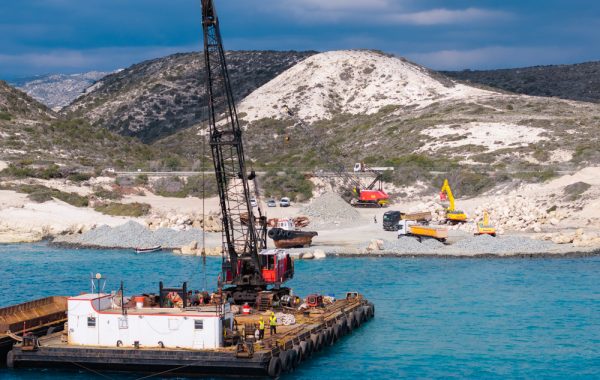Climate change is the talk of the year and with good reason, although it should have been the talk of at least the last two decades. The global temperature has increased by approximately 1.0°C above pre-industrial levels, because of human activities. And this is only the beginning of the world we will be living in, with far worse predictions for increasing temperatures, sea level rise, and extreme weather events in the not so distant future.
Scientists estimate that with 2°C increase, 18% of insects, 16% of plants and 8% of vertebrates are expected to lose over half of the range that climate conditions allow them to occupy. A landmark study done in 2004 has shown that by 2050, 15-37% of more than 1100 endemic animal and plant species would be committed to extinction, even with mid-range global warming scenarios. What does this mean for biodiversity though, if we were to add this to the fact that 75% of land surface of the globe has already been significantly altered, 66% of the ocean area is experiencing impacts and over 85% of wetlands have already been lost!
If we think we are ‘above’ climate change or habitat loss in Cyprus, we are gravely mistaken. The predictions on rising temperatures and extreme weather conditions are grim for our island. By 2050, it is expected that the temperature will increase by 1.3-1.9°C (compared to the 1961-1990 levels) while the number of days with temperatures over 35°C is expected to increase to more than 34 a year, inland. Dry periods of low rainfall are also expected to become more regular.

When it comes to habitat loss, Cyprus does not hesitate to take the lead on some shameful fronts. Cyprus was one of the top three EU countries on land take in the period 2012-2018 and had twice as high density of motorways than the EU average in 2012. To add to this, the State is tragically failing to protect Natura 2000 sites, as shown by the letter of formal notice that the European Commission sent to Cyprus last November. It is also occasionally turning a blind eye to its own legal tools and often drawing up plans and implementing policies that counteract, and sometimes even compete with, each other.
One such case, and very relevant to our struggle to adapt to climate change, was the 2010-2020 National Plan for Renewable Energy. When the Environment Authority assessed this Plan on a strategic level in 2011, it had issued its official opinion that there is a need to develop a Special Planning Framework. This Framework was to take into account all environmental information and especially that related to nature protection, in an effort to regulate the issue of the concentration of Renewable Energy Projects – wind farms and photovoltaic parks – in Natura 2000 sites.
Not surprisingly, this Special Planning Framework was never drafted by the relevant authorities. The race to reach our 13% renewable energy target by 2020 was still on though, and quite rightly so, but also quite frantically so. What happened as a result?
Just last year, a wind farm was given the green light to be installed within a Natura 2000 site, ignoring a relevant Ministerial Order according to which wind farms are not allowed within Natura 2000 sites. A 12 MW Photovoltaic Park was allowed to go ahead in an area particularly important for the Eleonora’s Falcon (Falco eleonorae) and the Red-footed Falcon (Falco vespertinus). To top all that, within the last two years alone, more than 100 Photovoltaic Park applications were submitted for assessment, many of which concern Parks in valuable farmland and some affecting Natura 2000 sites.
What would a Cypriot Greta Thunberg say about Cyprus’ plans to tackle the climate crisis?
03 March 2020

Share to



Climate change is the talk of the year and with good reason, although it should have been the talk of at least the last two decades. The global temperature has increased by approximately 1.0°C above pre-industrial levels, because of human activities. And this is only the beginning of the world we will be living in, with far worse predictions for increasing temperatures, sea level rise, and extreme weather events in the not so distant future.
Scientists estimate that with 2°C increase, 18% of insects, 16% of plants and 8% of vertebrates are expected to lose over half of the range that climate conditions allow them to occupy. A landmark study done in 2004 has shown that by 2050, 15-37% of more than 1100 endemic animal and plant species would be committed to extinction, even with mid-range global warming scenarios. What does this mean for biodiversity though, if we were to add this to the fact that 75% of land surface of the globe has already been significantly altered, 66% of the ocean area is experiencing impacts and over 85% of wetlands have already been lost!
If we think we are ‘above’ climate change or habitat loss in Cyprus, we are gravely mistaken. The predictions on rising temperatures and extreme weather conditions are grim for our island. By 2050, it is expected that the temperature will increase by 1.3-1.9°C (compared to the 1961-1990 levels) while the number of days with temperatures over 35°C is expected to increase to more than 34 a year, inland. Dry periods of low rainfall are also expected to become more regular.  © Markus Spiske
© Markus Spiske
When it comes to habitat loss, Cyprus does not hesitate to take the lead on some shameful fronts. Cyprus was one of the top three EU countries on land take in the period 2012-2018 and had twice as high density of motorways than the EU average in 2012. To add to this, the State is tragically failing to protect Natura 2000 sites, as shown by the letter of formal notice that the European Commission sent to Cyprus last November. It is also occasionally turning a blind eye to its own legal tools and often drawing up plans and implementing policies that counteract, and sometimes even compete with, each other.
One such case, and very relevant to our struggle to adapt to climate change, was the 2010-2020 National Plan for Renewable Energy. When the Environment Authority assessed this Plan on a strategic level in 2011, it had issued its official opinion that there is a need to develop a Special Planning Framework. This Framework was to take into account all environmental information and especially that related to nature protection, in an effort to regulate the issue of the concentration of Renewable Energy Projects – wind farms and photovoltaic parks – in Natura 2000 sites.
Not surprisingly, this Special Planning Framework was never drafted by the relevant authorities. The race to reach our 13% renewable energy target by 2020 was still on though, and quite rightly so, but also quite frantically so. What happened as a result?
Just last year, a wind farm was given the green light to be installed within a Natura 2000 site, ignoring a relevant Ministerial Order according to which wind farms are not allowed within Natura 2000 sites. A 12 MW Photovoltaic Park was allowed to go ahead in an area particularly important for the Eleonora’s Falcon (Falco eleonorae) and the Red-footed Falcon (Falco vespertinus). To top all that, within the last two years alone, more than 100 Photovoltaic Park applications were submitted for assessment, many of which concern Parks in valuable farmland and some affecting Natura 2000 sites.
Have we learned from our mistakes? Will there be a Special Planning Framework for Renewables for 2021-2030 that will take Natura 2000 sites, farmland valuable to nature, wetlands, water bodies and landscape into account?
Unfortunately, the National Energy and Climate Plan for the next decade does not allow us to be overly optimistic. The finalized National Energy and Climate Plan calls for a reduction by approximately 21% (compared to 2005 levels) in greenhouse gases of the non-ETS Sector (ETS in Cyprus comprises three power stations and some factories) if all the planned measures and policies are met. With the binding commitment for Cyprus set at 24%, the road is already paved for failure.
Most importantly, and most tragically, there is no real evidence that Cyprus will apply the ecosystem approach for tackling climate change. That our protected areas, our wetlands, our low-intensity farmlands, our forests and Mediterranean scrublands are actually carbon sinks falls through the cracks in the State planning for climate. That increasing their resilience by managing them appropriately and restoring them can be the nature-based solution is nowhere near the front line of Cyprus’s fight against climate change. Salt marshes for example provide natural protection from storms and flooding. What we do with our salt marshes in Cyprus is no secret, with the most important one, Akrotiri, besieged by development and not properly managed.
State shortcomings on the environmental front are, sadly, nothing new. But it is our role to keep fighting the good fight, by being engaged with the State at all possible levels, providing our comments on all relevant Plans and Studies and participating in public consultations, aiming to make bad environmental news a thing of the past. With 1 million species already facing extinction, we have no real other choice.
A Cypriot Greta Thunberg would be disappointed, but she would tell us to keep on fighting.




